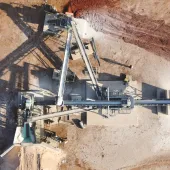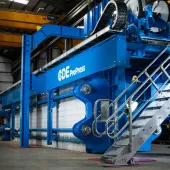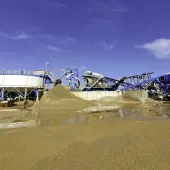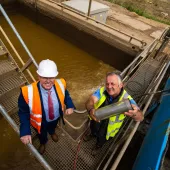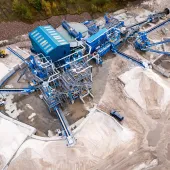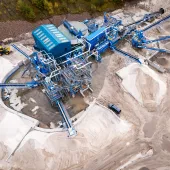MEP add value for Angle Park Sand & Gravel
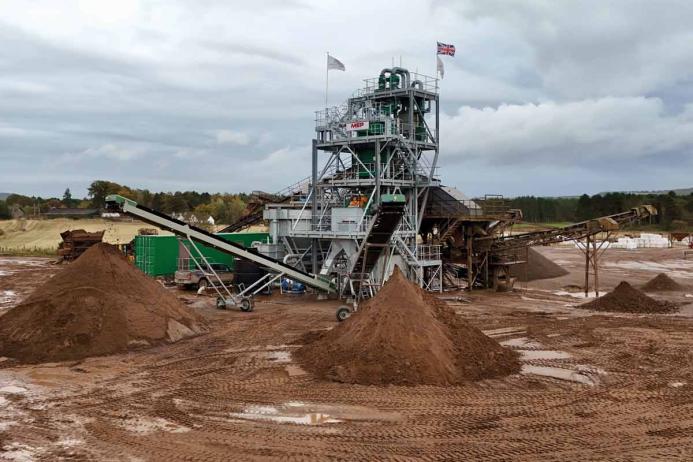
First published in the August 2025 issue of Quarry Management
Mineral Engineering Processes optimize sand classification and water treatment at Melville Gates Quarry
Mineral Engineering Processes (MEP) Ltd are an independent family business, first incorporated in 1983 as part of the RO Stokes group, that have been operating since 2002 when they took over the sales and service of the Stokes range of specialist products. Since then MEP have built a dedicated customer base supplying equipment around the world, but primarily to the UK mining and quarrying sectors.
MEP specialize in mineral process engineering, providing sales and service for their specialist range of proprietary equipment, which includes TBS hydrosizers, hydrocyclones, thickeners, and other associated equipment. They are also the UK and Ireland sales agent for the Pozzato range of log-washers and screens. MEP say their unique selling point is efficiency and building bespoke plants based on customers’ needs rather than picking a plant from a standard catalogue.
Providing added value to their clients is central to MEP’s work, whilst designing and developing equipment and solutions for the beneficiation and classification of quality products created from raw minerals. The company aims to deliver the highest-quality service, on time and on budget, providing well-designed, user-friendly plant and machinery that exceeds customers’ expectations.
In 2023 Angle Park Sand & Gravel awarded MEP the contract to design, supply, deliver, construct, and commission a new, fully operational, sand-classification and water-treatment plant for their Melville Gates Quarry, near Ladybank, Fife.
Angle Park Sand & Gravel are an independent family business founded in 1961 to produce and supply high-quality materials for the construction of the new town of Glenrothes, in Fife, Scotland. Today, they continue to grow the business with the same values and aims, to produce high-specification materials for the building trade, local authorities, and private individuals.
MEP’s experience of supplying equipment for specialist sands in Scotland dates back to 1980s when they supplied TBS hydrosizers for deligniting and producing tight-specification construction and sports sands.
The Melville Gates project involved the supply and installation of a bespoke 100 tonnes/h sand-classification plant capable of accepting a feed of –2mm sand with 200m3/h of water from the existing screening equipment. Whilst the MEP sand plant supplied is capable of producing a variety of sand gradings, the main objective of the project was to produce a USGA specification sports sand.
The feed slurry enters the coarse section of a two-compartment sump and is pumped to two primary cyclones for partial dewatering and silt removal. The cyclone overflow reports to a water control box for sump level management using level sensors, actuated valves and a PID loop, or discharges to the water-treatment plant, while the cyclone underflow feeds the TBS 2400 hydrosizer.
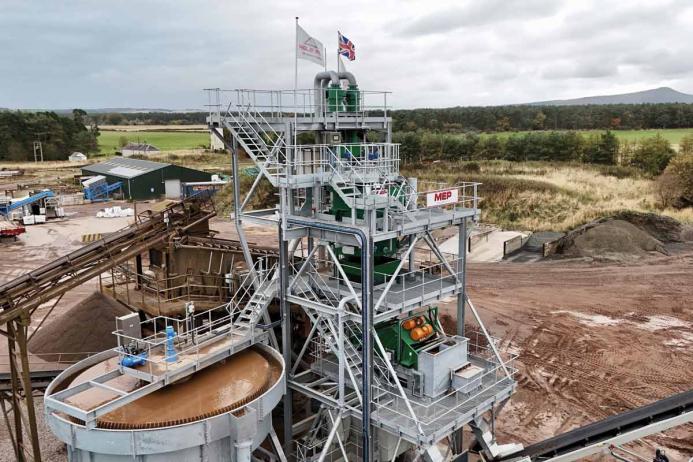
The TBS hydrosizer is a hindered-settling classifier that uses upward current water and mineral to create a column of teeter within the tank. The density in the machine is constantly monitored and automatically controlled. The machine can be set to give a required classification – the larger and heavier particles which concentrate at the bottom of the tank are discharged through the spigot valves, while the finer and lighter particles overflow the weir and are collected in the overflow launder.
The control system gives an immediate response to variations in feed rates up to 100%. The TBS hydrosizer uses the teeter plate system to evenly distribute the upward current of water within the machine; this helps to give a controlled and steady condition within the tank to ensure maximum accuracy in classification. To date, MEP have sold more than 400 TBS hydrosizers worldwide to countries including the UK, Australia, China, India, Kazakhstan, Ukraine, and the US.
Angle Park’s TBS 2400 hydrosizer offers flexible classification based on particle size or specific gravity. Operators can adjust the cut size between 0.125mm and 0.800mm via HMI controls and/or by adjusting the upward current water flow. This control and adjustability allows Angle Park to tailor their sand products to each customer’s specific requirements.
Material from the TBS hydrosizer underflow is discharged to the coarse side of the dewatering screen. Overflow from the TBS hydrosizer reports to the fine section of the two-compartment sump and is pumped to a secondary cyclone. The underflow from the secondary cyclone passes to the fine side of the dewatering screen, while the overflow is routed to the water control box.
The dewatering screen features a longitudinal divider for separating coarse and fine products, whilst the discharge chute includes a blending facility to allow Angle Park to blend fine sand back into their coarser products when required.
Effluent is treated in a 6.0m diameter thickener tank with automated flocculant dosing provided by an MEP effluent monitor which controls the speed of the dosing pump by taking regular samples from the thickener feedwell and measuring the effluent solids settling rate. If the measured settling time is greater than or less than the setpoint, the dosing pump speed is increased or reduced, respectively, thereby optimizing flocculant consumption.
The clean water from the thickener is used to supply the TBS hydrosizer and the existing screening equipment’s spraybars.
The plant includes an optional sludge-management system that allows settled sludge from the thickener to be blended into the fine sand on the dewatering screen deck via a sludge spreader, rather than being pumped to the lagoon. This maximizes product recovery and product optimization, and reduces waste.
Peter Cuthbert, general manager of Angle Park Sand & Gravel, commented: ‘We’d like to thank MEP for delivering the project in a timely fashion. From the start our aim was to produce better products from our natural raw feed. The TBS hydrosizer enables us to do so with control, and has allowed us to diversify into new products and markets.’
MEP sales manager Steve Slingo said: ‘We understood the importance of installing a plant that would secure the future of the Angle Park family business for years to come. It was critical that we designed and built a plant that offered the flexibility and opportunity to produce a range of end products that would fit into their existing and new markets.’
Acknowledgement
MEP would like to thank their contractor team – Centristic Ltd and Wells Electrical Contracting Ltd – for their work on the Angle Park project.
Subscribe to Quarry Management, the monthly journal for the mineral products industry, to read articles before they appear on Agg-Net.com


